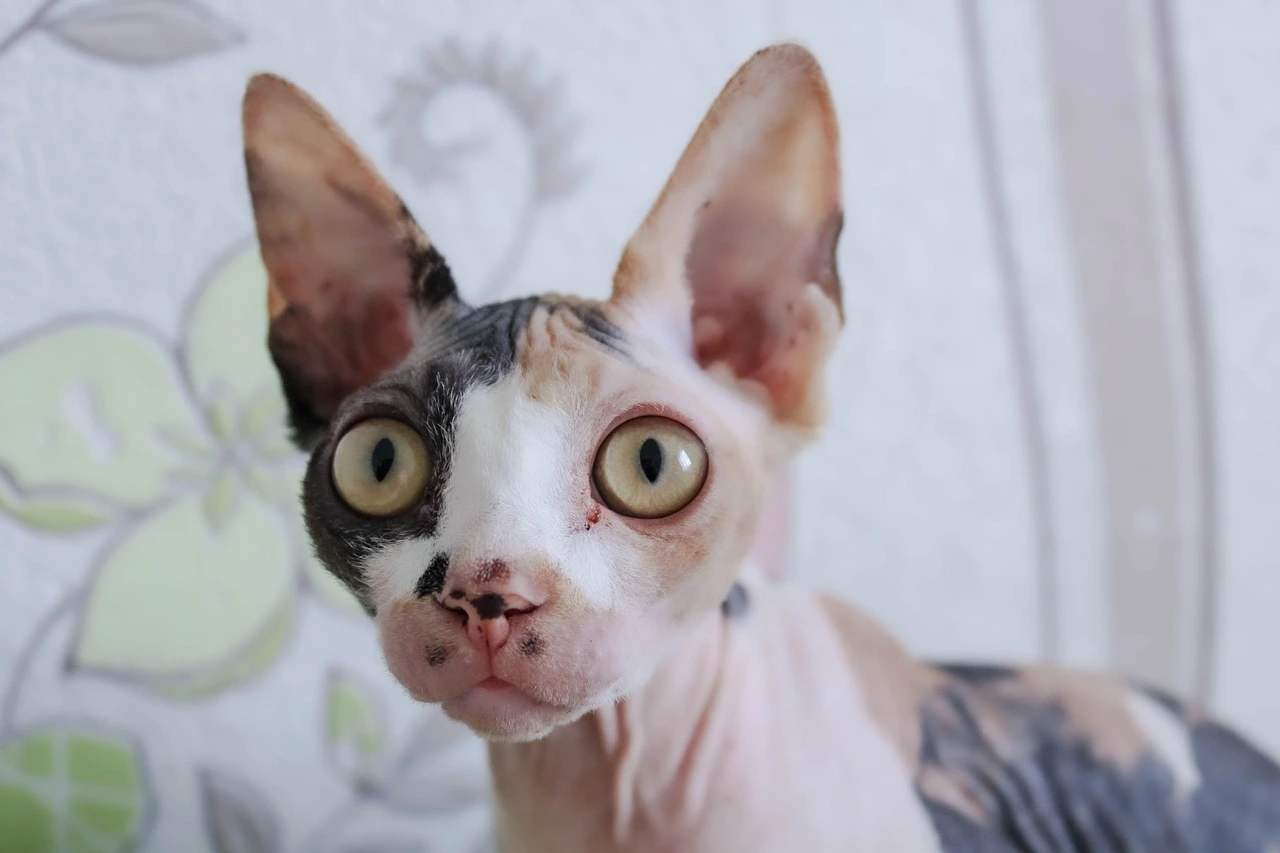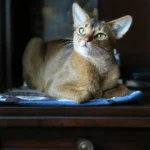Get ready to dive into the world of Sphynx cats. These hairless cats have captured the hearts of countless cat enthusiasts. They offer a unique experience that’s unlike any other.
They have a special look that makes them stand out. They don’t have fur, but their playful and loving nature makes them irresistible. This guide will show you why They are such wonderful pets.
Table of Contents
Understanding the Unique World of Sphynx Cats
Sphynx cats, also known as “Egyptian cats,” have won the hearts of many. They are known for their hairless look and interesting history. These cats bring a special view to the world of cat breeds. Let’s look into their origins and what makes them unique.
Origins and Historical Background
The Sphynx cat’s history starts in the 1960s in Canada. A genetic mutation led to the first hairless kittens. Breeders saw the potential and started breeding them. Now, these egyptian cats are loved for their looks and personality.
Common Misconceptions About Hairless Cats
- Sphynx cats are not completely hairless. They have a soft, downy fur that feels like peach-fuzz.
- They are not hypoallergenic. Their lack of fur might reduce some allergens, but they still cause allergic reactions.
- They are not more fragile than other cats. With the right care, they can live long, healthy lives.
Physical Characteristics and Traits
Sphynx cats stand out with their big eyes, cheekbones, and wrinkled skin. They are muscular and have a unique shape. Even without fur, they need regular grooming to keep their skin healthy.
“Sphynx cats are unique companions, enchanting with their striking appearance and lively personalities.”
Exploring hairless felines will show you the Sphynx cat’s charm. They make great additions to any family.
Are Sphynx Cats Really Hypoallergenic Pets?
If you or a family member has pet allergies, you might wonder about Sphynx cats. These hairless cats are often called hypoallergenic. But, the truth is more complicated.
Sphynx cats make less of the proteins that cause allergies. They don’t shed much and have no fur. This means they don’t spread as much cat dander around your home.
But, Sphynx cats still have some allergens. They are in their saliva and skin oils. People with severe allergies might still react to them. It’s also true that some Sphynx cats might be more hypoallergenic than others.
If you’re thinking about getting a Sphynx cat, spend time with the one you like. This will help you see how you react. Also, talk to your allergist to understand how owning a Sphynx might affect you.
- Sphynx cats produce less of the proteins that trigger allergic reactions, but they are not entirely allergen-free.
- The reduced shedding and lack of fur means they don’t disperse as much cat dander, making them a better option for allergy sufferers.
- However, They still produce some allergens in their saliva and skin oils, so individuals with severe pet allergies may still experience symptoms.
- Allergen levels can vary significantly between individual Sphynx cats, so it’s important to interact with the specific cat you’re considering to assess your personal reaction.
In conclusion, Sphynx cats might be a good choice for some with allergies. But, it’s key to think about your own needs and how you react to them before bringing one home.
Essential Care Tips for Your Hairless Companion
Owning a Sphynx cat means you need to groom and care for them differently. These cats don’t have fur, so their skin needs special attention. Here are the key care tips for your hairless friend.
Skin Care and Maintenance
Sphynx cats have very delicate skin because they don’t have fur. It’s important to regularly groom them. Use a soft, damp cloth to wipe their skin clean.
Choose skin care products made for hairless cats. These products will help keep their skin healthy and nourished.
Temperature Regulation Needs
Sphynx cats feel temperature changes more because they don’t have fur. Ensure their environment is kept at a comfortable temperature. Avoid very hot or cold places.
Give them cozy blankets or sweaters. These help them stay warm or cool as needed.
Bathing and Cleaning Requirements
It’s important to bathe your Sphynx cat regularly. This keeps them clean and prevents skin problems. Use a mild, cat-safe shampoo and warm water.
Bathe them every few weeks. Dry them well after each bath. This stops moisture from causing skin issues.
| Skin Care Tip | Frequency |
|---|---|
| Wipe down with damp cloth | Daily |
| Apply specialized skin care product | Weekly |
| Bathe with gentle shampoo | Every 2-3 weeks |
By following these care tips, you can keep your Sphynx cat’s skin healthy and happy. Understanding their unique needs is crucial for their well-being and happiness.
Health Considerations Specific to Sphynx Cats
Sphynx cats are unique and captivating, but they have their own health concerns. It’s important to understand their specific needs and vulnerabilities. This knowledge helps us give them the care and attention they deserve.
One major health issue for Sphynx cats is their lack of fur. This makes them more prone to cat health problems like skin infections, allergies, and trouble regulating their body temperature. Regular veterinary care and good skincare are key to keeping them healthy.
- Skin Care: Sphynx cats need to be bathed and moisturized often. This keeps their skin healthy and prevents dryness, irritation, and infections.
- Temperature Regulation: Without fur, Sphynx cats are more sensitive to temperature changes. They may need extra heating or cooling to stay comfortable.
- Dental Health: Sphynx cats can be prone to dental problems. Regular dental check-ups and cleanings are important.
It’s crucial for Sphynx cat owners to watch their pet’s health closely. They should also have a good relationship with their veterinary care provider. Regular check-ups, vaccinations, and quick action on any health issues can help these cat health companions live long and happy lives.
Understanding Sphynx Cat Personality and Behavior
Sphynx cats are truly unique. They stand out not just in looks but also in personality. These hairless cats love to be around people and form strong bonds. They are intelligent and able to learn a variety of tricks.
Social Nature and Family Dynamics
Sphynx cats are very affectionate and love to be close to their owners. They act like dogs, wanting to please and get attention. They fit well into families, getting along with kids and other pets.
Intelligence and Training Potential
Sphynx cats are very smart. They learn quickly and respond well to positive training. With patience, they can learn many tricks. This makes them great pets for those who want a smart and interactive cat.
Energy Levels and Exercise Needs
Sphynx cats are full of energy and love to play. They need lots of exercise and mental challenges to stay happy. Giving them plenty of playtime and activities is key to their well-being.
| Trait | Description |
|---|---|
| Social Nature | Affectionate, clingy, and enjoys human interaction |
| Intelligence | Highly intelligent and responsive to positive reinforcement training |
| Energy Levels | Energetic and playful, requiring regular exercise and mental stimulation |
Cost and Commitment of Owning a Hairless Cat
Getting a cat care friend like a Sphynx cat is a big choice. It means thinking about the pet expenses and the long-term commitment. These special, hairless cats are loved by many, but knowing the costs and time needed is key.
The first cost of a Sphynx cat can be from $2,000 to $8,000. This depends on the breeder, the cat’s background, and any health needs. After buying, there are ongoing costs for food, litter, toys, and vet visits. These can add up to over $1,000 a year.
Sphynx cats also need a lot of time from their owners. They love to play and need lots of exercise and playtime. They also need regular grooming and skin care to keep their look.
| Cost Category | Estimated Annual Expenses |
|---|---|
| Food and Litter | $300 – $600 |
| Veterinary Care | $400 – $800 |
| Grooming and Supplies | $200 – $400 |
| Toys and Accessories | $100 – $200 |
| Total Estimated Annual Cost | $1,000 – $2,000 |
Before getting a Sphynx cat, think about the money and time you’ll spend. Good cat care and understanding the pet expenses and adoption considerations are important. They help make sure you and your Sphynx cat will have a happy life together.
Conclusion
Sphynx cats are truly unique feline companions. They offer a special experience for pet owners. Their captivating appearance and endearing personalities have won many hearts in the United States.
This guide has covered the basics of Sphynx cat ownership. We’ve looked at their origins, physical traits, care needs, and health considerations. Understanding the joys and challenges of owning a hairless cat helps you decide if a Sphynx is right for you.
Owning a Sphynx cat requires patience, dedication, and a deep appreciation for them. But for those ready to care for them, the rewards are great. These cats can become cherished family members, bringing joy, companionship, and a unique view of the world.
FAQ
What makes Sphynx cats unique?
Sphynx cats stand out because they have no fur. Their smooth, warm skin is a big draw for cat lovers. This makes them a popular choice as pets.
Are Sphynx cats hypoallergenic?
Sphynx cats are said to be hypoallergenic, but they still have allergens. They might be better for people with allergies because they don’t shed much.
How do I care for a Sphynx cat’s skin?
Caring for a Sphynx cat’s skin is key. You’ll need to bathe them often and moisturize their skin. Clean their ears and eyes too. Keeping their environment at a comfortable temperature is also important.
What health considerations should I be aware of with Sphynx cats?
Sphynx cats might get certain health issues like heart problems and dental issues. Regular vet visits and shots are crucial. This helps catch health problems early.
How do Sphynx cats typically behave?
Sphynx cats are very social and loving. They enjoy playing and engaging with their owners. They’re smart and need lots of exercise and mental challenges.
What are the costs and commitments involved in owning a Sphynx cat?
Owning a Sphynx cat is a big deal. It costs a lot upfront and there are ongoing expenses for grooming and vet care. They need a lot of attention and care, so be ready to invest time and resources.






